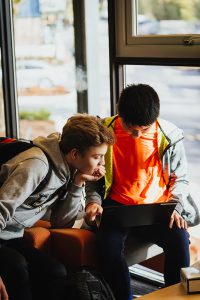Course Guide

The EPS curriculum is a reflection of how we know students learn best. Our curricular work is informed by: (1) current research in cognitive and adolescent development, (2) a deep understanding of the essential content and ways of thinking in each academic discipline, and (3) a working knowledge of our students.
Courses are authored collaboratively by our academic discipline faculty, and further processed, refined, and endorsed by our Academic Design & Integration Group.
We start from the following premises…
Students learn best when they build on prior knowledge.
- Teachers and students use their existing knowledge as a foundation for new learning.
- Students reinforce new knowledge by making connections to previous coursework, their personal lives, and different academic disciplines.
- Class content and activities intentionally increase in complexity as students encounter new contexts and more sophisticated thinking at each grade level.
Students retain information best when it is experienced in meaningful ways.
- Students pursue answers to questions worth asking and are provided opportunities to discover knowledge for themselves.
- Teachers leverage the “ways of thinking” specific to each academic discipline (English, Social Science, Math, Science, Technology, Physical Education, Spanish, Interdisciplinary) to organize course content and student activities.
- Teachers continuously ask the question: What are students doing? as they design hands-on, experiential activities.
Students invest in their learning when they exercise choice and pursue personal interests in both assignments and course selection.
- Where it makes sense, students are encouraged to find the best mediums to evidence what they know.
- Students make course choices from a wide array of offerings including individual courses, seminars, and independent study options.
Students learn most deeply when they are self-aware, metacognitive and reflective.
- Students learn to leverage their strengths to bolster their personal and academic growth.
- Teachers model how they think about their thinking in the classroom.
- Students engage multiple opportunities to explore their own thought processes and become more effective and strategic thinkers.

